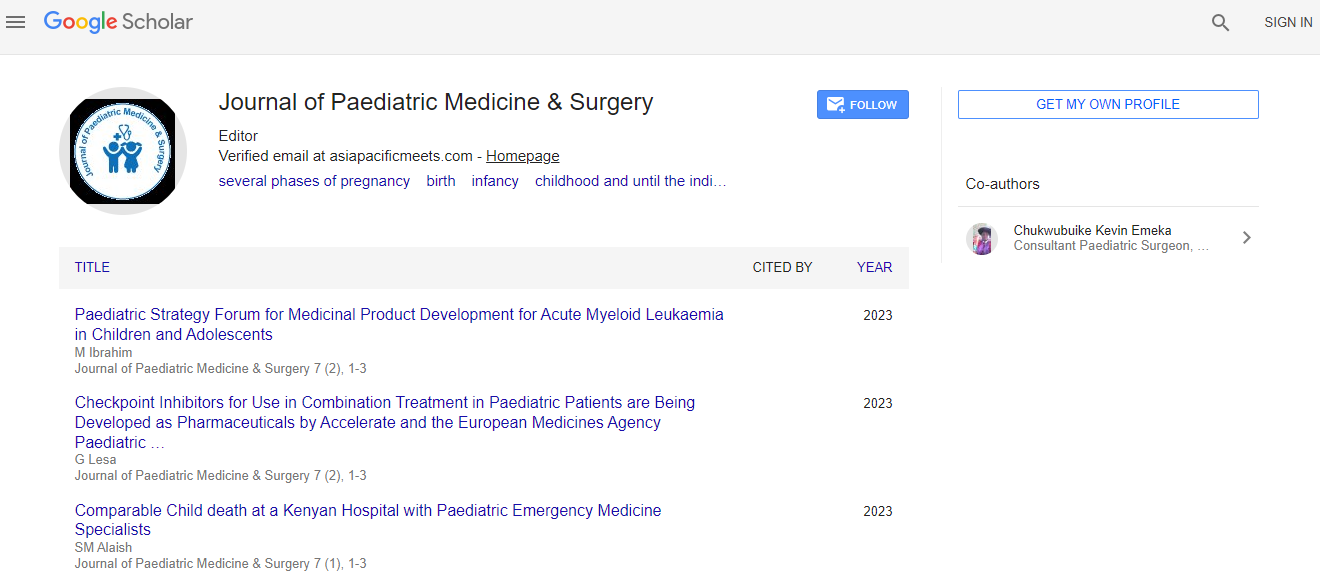Health Care, Nutrition & Pediatrics Meet 2019: Supportive care of the sick neonate - Monika Kaushal - Emirates Specialty Hospital
*Corresponding Author:
Copyright: © 2019 . This is an open-access article distributed under the terms of the Creative Commons Attribution License, which permits unrestricted use, distribution, and reproduction in any medium, provided the original author and source are credited.
Abstract
Neonates are the future of the society and care of the neonates in the first few days of life is extremely unique. The little ones who have some health problems right after birth (after birth) should definitely need some special care in special units like NICU or SCUBU. Here is the guidance on essential newborn care and the management of problems in neonates and young infants, from birth to 2 months of age. It includes neonatal resuscitation, the recognition and management of neonatal sepsis and other bacterial infections, and the management of preterm and low-birth-weight infants. For all newborns i.e., premature babies and sick full-term infants admitted to a neonatal intensive care unit (NICU), and this is divided into two general components: supportive which means care is essential to keep as near to normal homeostatic function as possible and another component is reactive which means treatment ongoing in response to illness or change in an infant’s health. Now there is an improvement in neonatal survival rate, there is growing attention and emphasis on improving quality of neonatal care. A key strategy toward that end is enlightening clinical care at facilities for sick neonates. Facility-based neonatal care entails institutionalized care of sick neonates. The National Health Mission has made significant investments to this end in setting up Special Newborn Care Units at district levels. Hospitalization of a sick neonate separates the baby from her/his mother and family. Typically neonatal units have focused upon technology-driven, provider-centered care for sick neonates, where parental/family participation in caring and decision-making regarding their own babies is severely limited. The psychosocial needs of babies and families remain unaddressed. While neonatal survival may be positively impacted upon, the current model of care is not adequately client/family centered, indeed, there is sufficient evidence that they lead to anxiety and stress among parents and family members. The fetal lung is not basically mature until about 35 weeks, gestation: Respiratory failure can be caused by unfinished lung growth or surfactant shortage, and it is one of the major causes of morbidity and mortality in preterm babies.
The original support given depends on the gestational age at birth and clinical condition of the infant. The earlier the gestation at birth, the higher the likelihood that prolonged respiratory support will be required. There are several aspects of mechanical and pharmacological respiratory support. To take care of these babies especially those who need help for their breathing we need not only especial unit, but especial infrastructures, equipment’s??? and trained medical professionals??? doctors and nurses. Nurses are back bone of the neonatal care. We need to focus on the supportive care which would be required by the sick neonates. Monitoring is most effective tool for efficient ventilation especially in the first few hours. A skilled nurses??? feel good or bad factor on newborns??? clinical picture is to be taken as the most crucial factor for deciding management strategies for the day. It will provide early evidence of potentially dangerous conditions- gas trapping and hyperinflation help to determine optimal PEEP, give immediate feedback on the effects of changes in ventilator parameters and the real-time monitoring would reduce the need for many ancillary tests such as chest X-ray, blood gas analysis, thus decreasing the cost of health care. This will allows better control of some variables. Irrespective of the technique or mode of ventilation chosen, the nursing principles are to identify the most appropriate device, technique and strategy to achieve and maintain adequate pulmonary gas exchange, minimize the risk of lung injury/recognition and prevention of VALI (Ventilator Associated Lung Injury), reduce newborn Work of Breathing (WOB) and Optimize newborn comfort for appropriate oxygenation and appropriate ventilation. Gas transport depends on ventilation, perfusion, hemoglobin and oxygen binding. Surfactant production depends on glucose, oxygen and other nutrition. Long term neurodevelopmental outcome is dependent on maintenance of normal oxygen, BP, glucose, nutrition, developmental care. Family support minimizes stress and optimizes outcomes.
Monitoring will include appearance, comfort, color, heart rate, capillary refill time, respiratory rate, chest expansion/ retraction, synchrony, urine output, abdomen, feeding, Central nervous system, pain, breastfeeding, social, emotional and financial. Supportive care would include positioning, physiotherapy, prevention of nosocomial infection, surveillance of flora, provision of in-utero like milieu, minimizing oxygen demand, schedule care activities at one go-club together approach softly and gently, humidification and pulmonary hygiene and suctioning, ABG monitoring, fluid and nutritional support, sedation, analgesia and paralysis, weaning, site and type of IV access, documentation, follow up care, emotional support and good communications.

 Spanish
Spanish  Chinese
Chinese  Russian
Russian  German
German  French
French  Japanese
Japanese  Portuguese
Portuguese  Hindi
Hindi 